By Norbert Bolz · Wednesday, December 2, 2020 When the historian Ernst Nolte formulated the thesis that Auschwitz was “the fear-induced reaction to the extermination processes of the Russian Revolution,” he was finished in the academic world. It was even of no help to him emphasizing that the copy was more irrational, more appalling and atrocious than the original. He was not forgiven the comparison since he seemed to call into question the singularity thesis, the incomparability of NS terror. That fit the taboo on totalitarianism theory. Right-wing and left-wing terror should not be mentioned in the same breath; National Socialism and International Socialism are not to be compared. And therefore all attempts to similarly work through the reign of terror by the Communists in its broad impact, as has been done with that of the Nazis, have been in vain. Of course, one would have to differentiate here. French intellectuals have undoubtedly been affected by the shocking reports by Koestler and Solzhenitsyn about the Moscow Trials and the Gulag. That was, at best, embarrassing for the German left. And so it should be no surprise that it celebrated Lenin’s 150th birthday—though under coronavirus conditions.
Lenin was the star of the Bolsheviks, who understood themselves to be the Jacobins of the twentieth century. He was undoubtedly an exceptionally gifted demagogue, but one should not imagine the Russian Revolution as resulting from a social movement; it was a project of intellectuals. The Bolshevik vanguard consisted of theorists, frequently emigrants, who had learned from Marx to use Hegel’s dialectic as a weapon. In this respect, the neo-Marxist bible History and Class Consciousness (1923) by Georg Lukács is still today unsurpassed. Here Hegel’s adroit dictum “all the worse for the facts” is taken seriously: more real than the facts is the totality as it presents itself from the standpoint of the proletarian class. In this way, dialectics becomes opium for the intellectuals.
Continue reading →
By Linas Jokubaitis · Thursday, September 26, 2013 As an occasional feature on TELOSscope, we highlight a past Telos article whose critical insights continue to illuminate our thinking and challenge our assumptions. Today, Linas Jokubaitis looks at Paul Piccone’s “Lukács’s History and Class Consciousness Half a Century Later,” from Telos 4 (Fall 1969).
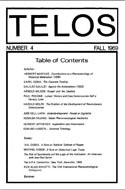 In 1969, when Paul Piccone wrote “Lukács’s History and Class Consciousness Half a Century Later,” almost fifty years had passed since the publication of Georg Lukács’s magnum opus. Piccone wrote this essay to mark that anniversary, and he argued that this work was an “underground classic.” Moreover, he asserted that this book was essential for any analysis of modern thought. According to Piccone, everyone attempting to understand and overcome the ideological crisis of Marxism would be wise to consult this book. In 1969, when Paul Piccone wrote “Lukács’s History and Class Consciousness Half a Century Later,” almost fifty years had passed since the publication of Georg Lukács’s magnum opus. Piccone wrote this essay to mark that anniversary, and he argued that this work was an “underground classic.” Moreover, he asserted that this book was essential for any analysis of modern thought. According to Piccone, everyone attempting to understand and overcome the ideological crisis of Marxism would be wise to consult this book.
Continue reading →
By J. F. Dorahy · Tuesday, March 5, 2013 As an occasional feature on TELOSscope, we highlight a past Telos article whose critical insights continue to illuminate our thinking and challenge our assumptions. Today, J.F. Dorahy looks at György Márkus’s “The Soul and Life: The Young Lukács and the Problem of Culture,” from Telos 32 (Summer 1977).
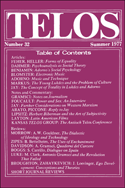 György Márkus’s essay on Lukács, “The Soul and Life,” is a seminal insight into one of the most influential philosophical oeuvres of the twentieth century. This piece, published at a time when only a handful of Márkus’s papers were available to English-language readers, reflects an intimacy with Lukács’s aesthetics that is unsurpassed in Lukács scholarship. (Márkus jointly edited, along with Frank Benesler, Lukács’s posthumously published Heidelberger Philosophie der Kunst 1916–18 and the Heidelberger Ästhetik 1916–1918, works that figure prominently in the essay under consideration.) The discussion in “The Soul and Life” centers on the problem of the possibility of culture as treated by Lukács in his pre-1918, or pre-Marxist, writings. György Márkus’s essay on Lukács, “The Soul and Life,” is a seminal insight into one of the most influential philosophical oeuvres of the twentieth century. This piece, published at a time when only a handful of Márkus’s papers were available to English-language readers, reflects an intimacy with Lukács’s aesthetics that is unsurpassed in Lukács scholarship. (Márkus jointly edited, along with Frank Benesler, Lukács’s posthumously published Heidelberger Philosophie der Kunst 1916–18 and the Heidelberger Ästhetik 1916–1918, works that figure prominently in the essay under consideration.) The discussion in “The Soul and Life” centers on the problem of the possibility of culture as treated by Lukács in his pre-1918, or pre-Marxist, writings.
Continue reading →
By J. F. Dorahy · Monday, December 31, 2012 As an occasional feature on TELOSscope, we highlight a past Telos article whose critical insights continue to illuminate our thinking and challenge our assumptions. Today, J. F. Dorahy looks at Georg Lukács’s “The Dialectic of Labor: Beyond Causality and Teleology,” from Telos 6 (Fall 1970).
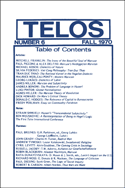 Georg Lukács’s essay “The Dialectic of Labor” belongs to the last period of his life and was composed in the context of the so-called “renaissance of Marxism”: a movement, beginning in the mid-1950s, within several of the Eastern Bloc nations—most notably Hungary, Poland, and the former Yugoslavia—that sought to re-energize the humanistic dimensions of Marxism suppressed by the enforcement of orthodoxy. Lukács’s substantive contribution to the “renaissance of Marxism” took the form of two enormous projects: a Marxist ontology (Zur Ontologie des gesellschaftichen Seins) and a systematic aesthetics (Die Eigenart des Ästhetischen). Although Lukács’s relationship to “dialectical and historical materialism” remains complex, “The Dialectic of Labor” stands as a reflection of this humanistic tendency inasmuch as it, by way of an ontological elucidation of the “philosophy of praxis,” emphasizes the functional role of subjectivity as a constitutive moment in the social-historical process. Georg Lukács’s essay “The Dialectic of Labor” belongs to the last period of his life and was composed in the context of the so-called “renaissance of Marxism”: a movement, beginning in the mid-1950s, within several of the Eastern Bloc nations—most notably Hungary, Poland, and the former Yugoslavia—that sought to re-energize the humanistic dimensions of Marxism suppressed by the enforcement of orthodoxy. Lukács’s substantive contribution to the “renaissance of Marxism” took the form of two enormous projects: a Marxist ontology (Zur Ontologie des gesellschaftichen Seins) and a systematic aesthetics (Die Eigenart des Ästhetischen). Although Lukács’s relationship to “dialectical and historical materialism” remains complex, “The Dialectic of Labor” stands as a reflection of this humanistic tendency inasmuch as it, by way of an ontological elucidation of the “philosophy of praxis,” emphasizes the functional role of subjectivity as a constitutive moment in the social-historical process.
Continue reading →
By Yonathan Listik · Tuesday, November 27, 2012 As an occasional feature on TELOSscope, we highlight a past Telos article whose critical insights continue to illuminate our thinking and challenge our assumptions. Today, Yonathan Listik looks at Georg Lukács’s “The Old Culture and the New Culture” from Telos 5 (Spring 1970).
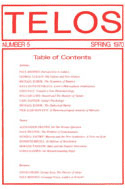 It would be simplistic to argue that behind the Marxist critiques of capitalist society there was only an objective intention simply to improve its effectiveness and avoid the political complications found in capitalist society. Despite its strict scientific tone, Marxism still carries a heavily moral intention. This is what Georg Lukács comes to argue in this essay on culture. In his analysis of capitalist cultural structure and its many differences from capitalist reality, Lukács points to what he regards as the ultimate goal behind communism: a new cultural order. It would be simplistic to argue that behind the Marxist critiques of capitalist society there was only an objective intention simply to improve its effectiveness and avoid the political complications found in capitalist society. Despite its strict scientific tone, Marxism still carries a heavily moral intention. This is what Georg Lukács comes to argue in this essay on culture. In his analysis of capitalist cultural structure and its many differences from capitalist reality, Lukács points to what he regards as the ultimate goal behind communism: a new cultural order.
Continue reading →
By Timothy Hall · Friday, July 8, 2011 Timothy Hall’s “Reification, Materialism, and Praxis: Adorno’s Critique of Lukács” appears in Telos 155 (Summer 2011). Read the full version online at the TELOS Online website, or purchase a print copy of the issue here.
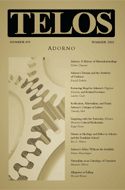 This essay focuses on Adorno’s critique of Lukács in Negative Dialectics. While Adorno is generally viewed as a trenchant critic of Lukács, Adorno’s work testifies to a lifelong engagement with Lukács’s early writings, up to and including History and Class Consciousness. The essay looks at the seemingly contradictory critique developed by Adorno that Lukács’s concept of praxis was both idealist and romantic anti-capitalist. It was idealist insofar as a latent subjectivism in his thought led to a “productivist” account of the subject and the social world; it was romantic anti-capitalist in that it opposed an economy based on use value to the capitalist present dominated by the principle of exchange. The essay argues that there is no inconsistency, on Adorno’s part, in maintaining both. Romanticism as a critique is internal to the enlightenment, and the oscillation between idealism and the romantic rejection of it evidenced in Lukács’s work was consistent with the instability at the heart of the idealist account of enlightenment modernity. The essay concludes by speculating on the possibility of an object-centered conception of praxis in Adorno’s work. This essay focuses on Adorno’s critique of Lukács in Negative Dialectics. While Adorno is generally viewed as a trenchant critic of Lukács, Adorno’s work testifies to a lifelong engagement with Lukács’s early writings, up to and including History and Class Consciousness. The essay looks at the seemingly contradictory critique developed by Adorno that Lukács’s concept of praxis was both idealist and romantic anti-capitalist. It was idealist insofar as a latent subjectivism in his thought led to a “productivist” account of the subject and the social world; it was romantic anti-capitalist in that it opposed an economy based on use value to the capitalist present dominated by the principle of exchange. The essay argues that there is no inconsistency, on Adorno’s part, in maintaining both. Romanticism as a critique is internal to the enlightenment, and the oscillation between idealism and the romantic rejection of it evidenced in Lukács’s work was consistent with the instability at the heart of the idealist account of enlightenment modernity. The essay concludes by speculating on the possibility of an object-centered conception of praxis in Adorno’s work.
Continue reading →
|
|
 In 1969, when Paul Piccone wrote “Lukács’s History and Class Consciousness Half a Century Later,” almost fifty years had passed since the publication of Georg Lukács’s magnum opus. Piccone wrote this essay to mark that anniversary, and he argued that this work was an “underground classic.” Moreover, he asserted that this book was essential for any analysis of modern thought. According to Piccone, everyone attempting to understand and overcome the ideological crisis of Marxism would be wise to consult this book.
In 1969, when Paul Piccone wrote “Lukács’s History and Class Consciousness Half a Century Later,” almost fifty years had passed since the publication of Georg Lukács’s magnum opus. Piccone wrote this essay to mark that anniversary, and he argued that this work was an “underground classic.” Moreover, he asserted that this book was essential for any analysis of modern thought. According to Piccone, everyone attempting to understand and overcome the ideological crisis of Marxism would be wise to consult this book.  György Márkus’s essay on Lukács, “The Soul and Life,” is a seminal insight into one of the most influential philosophical oeuvres of the twentieth century. This piece, published at a time when only a handful of Márkus’s papers were available to English-language readers, reflects an intimacy with Lukács’s aesthetics that is unsurpassed in Lukács scholarship. (Márkus jointly edited, along with Frank Benesler, Lukács’s posthumously published Heidelberger Philosophie der Kunst 1916–18 and the Heidelberger Ästhetik 1916–1918, works that figure prominently in the essay under consideration.) The discussion in “The Soul and Life” centers on the problem of the possibility of culture as treated by Lukács in his pre-1918, or pre-Marxist, writings.
György Márkus’s essay on Lukács, “The Soul and Life,” is a seminal insight into one of the most influential philosophical oeuvres of the twentieth century. This piece, published at a time when only a handful of Márkus’s papers were available to English-language readers, reflects an intimacy with Lukács’s aesthetics that is unsurpassed in Lukács scholarship. (Márkus jointly edited, along with Frank Benesler, Lukács’s posthumously published Heidelberger Philosophie der Kunst 1916–18 and the Heidelberger Ästhetik 1916–1918, works that figure prominently in the essay under consideration.) The discussion in “The Soul and Life” centers on the problem of the possibility of culture as treated by Lukács in his pre-1918, or pre-Marxist, writings.  Georg Lukács’s essay “The Dialectic of Labor” belongs to the last period of his life and was composed in the context of the so-called “renaissance of Marxism”: a movement, beginning in the mid-1950s, within several of the Eastern Bloc nations—most notably Hungary, Poland, and the former Yugoslavia—that sought to re-energize the humanistic dimensions of Marxism suppressed by the enforcement of orthodoxy. Lukács’s substantive contribution to the “renaissance of Marxism” took the form of two enormous projects: a Marxist ontology (Zur Ontologie des gesellschaftichen Seins) and a systematic aesthetics (Die Eigenart des Ästhetischen). Although Lukács’s relationship to “dialectical and historical materialism” remains complex, “The Dialectic of Labor” stands as a reflection of this humanistic tendency inasmuch as it, by way of an ontological elucidation of the “philosophy of praxis,” emphasizes the functional role of subjectivity as a constitutive moment in the social-historical process.
Georg Lukács’s essay “The Dialectic of Labor” belongs to the last period of his life and was composed in the context of the so-called “renaissance of Marxism”: a movement, beginning in the mid-1950s, within several of the Eastern Bloc nations—most notably Hungary, Poland, and the former Yugoslavia—that sought to re-energize the humanistic dimensions of Marxism suppressed by the enforcement of orthodoxy. Lukács’s substantive contribution to the “renaissance of Marxism” took the form of two enormous projects: a Marxist ontology (Zur Ontologie des gesellschaftichen Seins) and a systematic aesthetics (Die Eigenart des Ästhetischen). Although Lukács’s relationship to “dialectical and historical materialism” remains complex, “The Dialectic of Labor” stands as a reflection of this humanistic tendency inasmuch as it, by way of an ontological elucidation of the “philosophy of praxis,” emphasizes the functional role of subjectivity as a constitutive moment in the social-historical process.  It would be simplistic to argue that behind the Marxist critiques of capitalist society there was only an objective intention simply to improve its effectiveness and avoid the political complications found in capitalist society. Despite its strict scientific tone, Marxism still carries a heavily moral intention. This is what Georg Lukács comes to argue in this essay on culture. In his analysis of capitalist cultural structure and its many differences from capitalist reality, Lukács points to what he regards as the ultimate goal behind communism: a new cultural order.
It would be simplistic to argue that behind the Marxist critiques of capitalist society there was only an objective intention simply to improve its effectiveness and avoid the political complications found in capitalist society. Despite its strict scientific tone, Marxism still carries a heavily moral intention. This is what Georg Lukács comes to argue in this essay on culture. In his analysis of capitalist cultural structure and its many differences from capitalist reality, Lukács points to what he regards as the ultimate goal behind communism: a new cultural order.  This essay focuses on Adorno’s critique of Lukács in Negative Dialectics. While Adorno is generally viewed as a trenchant critic of Lukács, Adorno’s work testifies to a lifelong engagement with Lukács’s early writings, up to and including History and Class Consciousness. The essay looks at the seemingly contradictory critique developed by Adorno that Lukács’s concept of praxis was both idealist and romantic anti-capitalist. It was idealist insofar as a latent subjectivism in his thought led to a “productivist” account of the subject and the social world; it was romantic anti-capitalist in that it opposed an economy based on use value to the capitalist present dominated by the principle of exchange. The essay argues that there is no inconsistency, on Adorno’s part, in maintaining both. Romanticism as a critique is internal to the enlightenment, and the oscillation between idealism and the romantic rejection of it evidenced in Lukács’s work was consistent with the instability at the heart of the idealist account of enlightenment modernity. The essay concludes by speculating on the possibility of an object-centered conception of praxis in Adorno’s work.
This essay focuses on Adorno’s critique of Lukács in Negative Dialectics. While Adorno is generally viewed as a trenchant critic of Lukács, Adorno’s work testifies to a lifelong engagement with Lukács’s early writings, up to and including History and Class Consciousness. The essay looks at the seemingly contradictory critique developed by Adorno that Lukács’s concept of praxis was both idealist and romantic anti-capitalist. It was idealist insofar as a latent subjectivism in his thought led to a “productivist” account of the subject and the social world; it was romantic anti-capitalist in that it opposed an economy based on use value to the capitalist present dominated by the principle of exchange. The essay argues that there is no inconsistency, on Adorno’s part, in maintaining both. Romanticism as a critique is internal to the enlightenment, and the oscillation between idealism and the romantic rejection of it evidenced in Lukács’s work was consistent with the instability at the heart of the idealist account of enlightenment modernity. The essay concludes by speculating on the possibility of an object-centered conception of praxis in Adorno’s work. 






